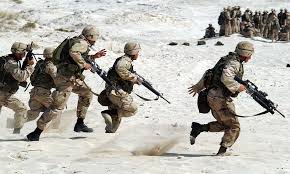Marine General Questions Obama Plan To Study Gay Ban
Scholars Concur that More Study is Unnecessary and Could Have Political Costs
SANTA BARBARA, CA, – A retired Brigadier General for the U.S. Marine Corps has questioned the Obama administration’s plan to form a Pentagon commission to study “don’t ask, don’t tell.” “There’s been enough studying throughout the years,” said General Hugh Aitken. “Creating a new study will not change the facts.”
Aitken participated in a comprehensive 2008 review of the policy which found that there is no evidence showing that openly gay service would harm the military, and a great deal of evidence showing it would not.
According to a February 1st Boston Globe report, the Obama administration has decided not to move forward on repealing “don’t ask, don’t tell” until the Pentagon can “undertake a detailed study of how a change in the policy would affect the military.” This may not happen for several months or longer, says the Globe article.
But scholars echoed General Aitken’s argument. Dr. Nathaniel Frank, senior research fellow at the Palm Center and author of the forthcoming book, Unfriendly Fire: How the Gay Ban Undermines the Military and Weakens America, said he has reviewed “all of the evidence on gays in the military, and there is simply no question about whether or not a policy change would undermine unit cohesion. It would not.”
Dr. Laura Miller, a well-respected military sociologist who co-authored a study on gays in the military with the late Charles Moskos, author of the gay ban, said “you don’t need a commission to tell you that you need to retain every able, trained, experienced and productive member at a time when both the stakes and the manpower needs are high.”
Dr. Gary Gates, a UCLA scholar who has authored a number of studies on gays in the military, agreed that “the proposal to study ‘don’t ask, don’t tell’ yet again seems unnecessary. Extensive scholarly research already shows that allowing the 65,000 gays and lesbians currently in uniform to serve openly will not harm the military in any way.”
Professor Diane Mazur, a former Air Force officer who teaches at the University of Florida and who has published widely on gays in the military, added that “every research study published over the last fifteen years has concluded that military readiness is not harmed—and may be strengthened—when all qualified Americans can serve and no one has to live in secrecy.”
Relevant research includes an extensive 1993 study by the RAND corporation as well as two official military studies: a 1989 study by the Defense Personnel Security Research Center and the Navy’s 1957 Crittenden report. It also includes numerous academic studies published in leading military journals such as International Security, Armed Forces and Society, and Parameters, the official journal of the U.S. Army War College. Most recently, a bi-partisan panel of retired flag officers, which included General Aitken, released a report last year which found that “don’t ask don’t tell” was unnecessary and harmful to the military. All these studies reached the same conclusion: that allowing open gay service would not undermine the military.
Frank’s new book, which is being called the definitive story of “don’t ask, don’t tell,” chronicles the history of the 1993 debates over gay service and shows that, even then, the word “study” quickly became code for “delay and kill.” “Sam Nunn said any review of the gay ban should begin with a ‘Pentagon study’,” said Frank. “Colin Powell said the president should move cautiously and ‘study’ the issue; Bob Dole said the president should appoint a ‘study commission’; and ultimately President Clinton called for a 6-month ‘study’ period. The result was ‘don’t ask, don’t tell’ which has made no one happy. I think there’s a lesson here.”
Dr. Aaron Belkin, director of the Palm Center and a nationally recognized expert on gay service, said that President Obama has stroke-of-the-pen authority to suspend gay discharges because, while the law mandates discharge if a “finding” is made of homosexual conduct, nothing in the law requires that such a finding be made.
Given CNN’s December 2008 poll showing 81 percent public approval for open gay service, Belkin said, Obama should not hesitate to end the policy by executive order. “Ironically, Obama’s careful effort to avoid Clinton’s mistakes could cause him to repeat them,” he said. “When President Clinton called a time-out to study the situation, that allowed opposition forces time to rally. In some cases, the Pentagon just needs to be told what to do.” Belkin said he has been told privately by top military officials that in cases like this one, they often prefer to be told what to do. “They know it’s the right step,” he said, “and sometimes they’d rather it be made for them.”
